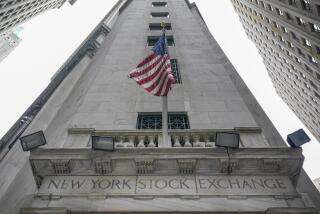Enron Link Weighs on Banks’ Shares
- Share via
NEW YORK — Shares of Citigroup Inc. and J.P. Morgan Chase & Co. plunged Tuesday, hit by investors’ growing fear that the two investment banks could face daunting legal liability over their dealings with Enron Corp.
The stocks plummeted amid allegations at a Senate hearing that the banks played a central role in helping Enron disguise its troubled finances. Citigroup shares sank $5.04, or 15.7%, to $27, and J.P. Morgan dived $4.44, 18.1%, to $20.08. They were the most active Big Board stocks.
One of the most startling allegations was that Citigroup intentionally misrepresented a 1999 transaction so Enron could mislead investors, experts said.
The revelations suggested that the banks did more than simply assist Enron in managing its finances, and may have been deeply involved in devising and constructing some of the company’s allegedly bogus financial machinations.
That distinction is key, legal experts said, because it could significantly heighten the banks’ exposure to lawsuits from private investors, which could be far more costly than any civil penalties exacted by the government.
“If the evidence bears out that the banks knowingly participated in the deception, then the risk of civil penalties, private liability and criminal sanctions could expose them to tens of billions of dollars, at least, in liability,” said Donald Langevoort, a Georgetown University law professor.
The banks vociferously defended themselves Tuesday, saying their Enron financings were common and proper.
Legal analysts said it is impossible at this point to gauge the banks’ responsibility, and they pointed out that it would be a challenge for civil or criminal prosecutors to prove wrongdoing.
Still, many investors chose not to wait around. Institutions have been burned over the last year by giving the benefit of the doubt to companies such as WorldCom Inc. when allegations of financial scandal first surfaced, only to see the stocks eventually collapse.
“It’s emotional and people are just panicking,” said Michael Stead, who runs the Wells Fargo SIFE Specialized Financial Services fund, which holds Citigroup shares.
Some experts defended Enron’s financing arrangements in which loans were listed on the firm’s books as commodity trades. They noted, as the banks have said, that Enron’s auditors approved the transactions.
As for Citigroup and J.P. Morgan, fans of the stocks said the fundamentals are favorable. Despite a weak market for investment banking, the economy is slowly improving and the banks’ financial stamina is much greater than during the early-1990s recession.
“These companies are so much stronger than they ever were before,” said Hal Schroeder, a money manager at Carlson Research & Analytics in New York.
Nevertheless, the companies could face severe legal exposure depending on their part in Enron’s deception, others warned.
In a 1994 ruling, the Supreme Court said lawyers and financial advisors cannot be sued by investors for “aiding and abetting” a stock fraud. Only those intimately involved in conceiving and perpetuating a fraud--so-called primary violators--can be held liable.
But Tuesday’s revelations about the banks “give plaintiffs’ attorneys a stronger argument that this goes beyond aiding and abetting,” said Henry Hu, a University of Texas law professor.
The banks could face legal problems even if they’re shown to have only assisted Enron’s deception: Despite the high court ruling, the Securities and Exchange Commission still could bring civil actions for aiding and abetting fraud, experts said.
That would pressure the Justice Department to bring criminal charges, either against individuals or the firms, Langevoort said.
Any such charges could have major economic consequences because of the role the giant banks play in financing U.S. growth. Authorities would have to balance the need to punish wrongdoing and send a message about deterrence with the potential economic jolt that criminal charges would bring, Langevoort said.
At a minimum, civil or criminal charges could seriously hurt the banks’ reputations. “The bigger exposure for these institutions is if people feel they can’t invest in them or do business with them,” said Reid Ashinoff, a partner at Sonnenschein Nath & Rosenthal.
More to Read
Inside the business of entertainment
The Wide Shot brings you news, analysis and insights on everything from streaming wars to production — and what it all means for the future.
You may occasionally receive promotional content from the Los Angeles Times.










